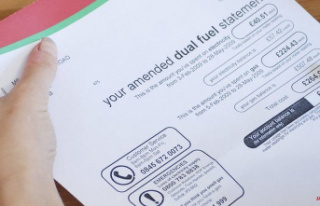According to its chief executive, most customers of Lloyds Bank have less than PS500 in savings.
Charlie Nunn stated that Lloyds has seen persistent debt problems in customers jump by a third in the first six months this year.
He said that although credit card travel spending was up by 300% compared to last year, the majority of Lloyd's customers are concerned about the rising cost of living.
He said that it was possible for the UK not to fall into the recession many have predicted.
This comes as UK households are struggling with rising fuel costs, food bills, and energy bills as inflation continues to rise at its fastest pace in 40 years.
According to the head of Britain's largest high-street bank, "80%" of UK customers and households have less than PS500 worth of savings in both their current and savings accounts.
"They may have money elsewhere. We can see that they have less than PS500. It's an important start point to look at financial resilience.
He said that half of these customers had increased the value of their accounts in the past few years and are now in a better financial position than before the covid epidemic.
According to the most recent figures, credit card spending is up at an unprecedented rate of 17 years. Travel was the largest driver.
He said that travel, which accounts for a large portion of credit card spending, has rebounded up nearly 300% year-on-year. This is due to Covid and the constraints surrounding travel returning people to where they are now.
He said that 75% of Lloyd's 26 million customers were concerned about the rising cost of living. 20 percent of them said they were cutting back on discretionary spending in order to afford the essentials.
"Customers are worried - and they should be. He said that he has seen areas where real challenges exist.
He said that despite a significant increase in people with trouble debts, only 1% were unable pay their daily bills.
Nunn stated that he was worried about the UK talking itself into recession.
"We are concerned that we are collectively talking ourselves into a negative outlook. There are areas of strength within the economy.
"Really, there are large parts of the UK's consumers who are strong and want to spend. We can continue to look for opportunities to invest in growth.
"But, yes, sentiment can be challenging."
Lloyds Banking Group, the UK's largest lender of small businesses and households, is often regarded as the weatherman for the UK economy.
Its chief executive is therefore an influential and important voice on the future of both household and business prospects.
According to Mr Nunn, the economy and house price would remain flat for the remainder of the year. However, he predicted that interest rates would rise by around 2% from the current rate of 1.25%.
This is significantly lower than the 3.5% predicted by others, as high energy prices perform a similar function to rising interest rates in forcing people spend less and dampening inflationary pressure.
He said, "We are saying no, but we can see that it will be a difficult few quarters of flat growth."
"It could be plus/minus a little, but it will be flat-growth in the next few quarters. What we really focus on is making sure that we provide support to those customers that are going to struggle to meet their needs and businesses as well. There are certain sectors and businesses that have that stress."
Lloyds employs more than 70,000 people. The Bank of England Governor has asked workers, employers and unions to be careful when offering a pay increase to stop an inflationary wage spiral. Unions were furious at the call.
Lloyds is one example of an employer that has tried something new.
Lloyds offered 64,000 employees a 3.6% increase in pay and a lump sum of at minimum PS1,000 for the autumn. Rolls Royce offered a more generous package - a 4% increase in pay and a lump sum of at least PS2,000 - but it was rejected by unions because it was essentially a below inflation pay rise disguised.
"We want to make sure that inflation is not built in in a way that's unnecessary isn't necessary," Mr Nunn stated. It seemed the right thing to do for this year. It was also the right thing to do in the face of the unprecedented inflation spike.
According to him, the bank will consider doing the same next fiscal year, depending on inflation.
Lloyds, a major lender of small and large businesses, is vulnerable to firms going bankrupt as their input costs rise at the same moment as their customers' incomes fall. However, Mr Nunn stated that he wasn't preparing for the possibility of companies going bankrupt.
"We don’t expect a significant rise in bad loans charges. That's not the situation we have. We're experiencing low growth, higher inflation, and a slight increase in stable unemployment. This is how we see the next four to six quarters.












